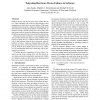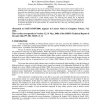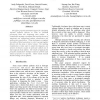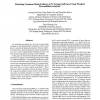32 search results - page 2 / 7 » Assessing the Effect of Software Failures on Trust Assumptio... |
SOSP
2009
ACM
14 years 2 months ago
2009
ACM
Hardware devices can fail, but many drivers assume they do not. When confronted with real devices that misbehave, these assumptions can lead to driver or system failures. While ma...
SIGCSE
2010
ACM
14 years 8 days ago
2010
ACM
The “Hacker Curriculum” exists as a mostly undocumented set of principles and methods for learning about information security. Hacking, in our view, is defined by the ability...
SAFECOMP
2000
Springer
13 years 9 months ago
2000
Springer
Fault tolerant systems based on the use of software design diversity may be able to achieve high levels of reliability more cost-effectively than other approaches, such as heroic ...
ICSE
2003
IEEE-ACM
14 years 5 months ago
2003
IEEE-ACM
This paper proposes automated support for classifying reported software failures in order to facilitate prioritizing them and diagnosing their causes. A classification strategy is...
APSEC
1997
IEEE
13 years 9 months ago
1997
IEEE
An underlying assumption for N-version programming technique is that independently developed versions would fail in a statistically independent mannel: Howevel; empirical studies ...




